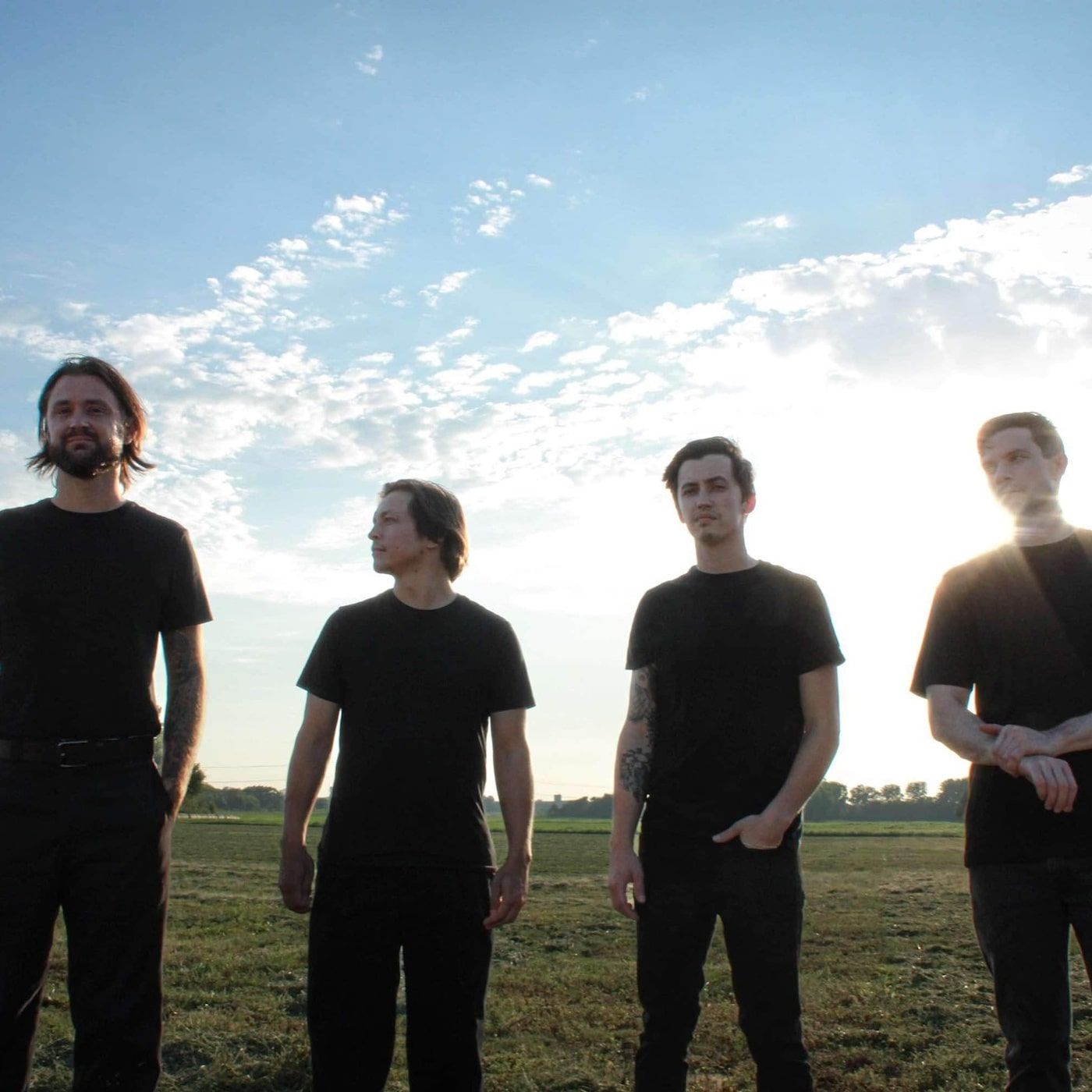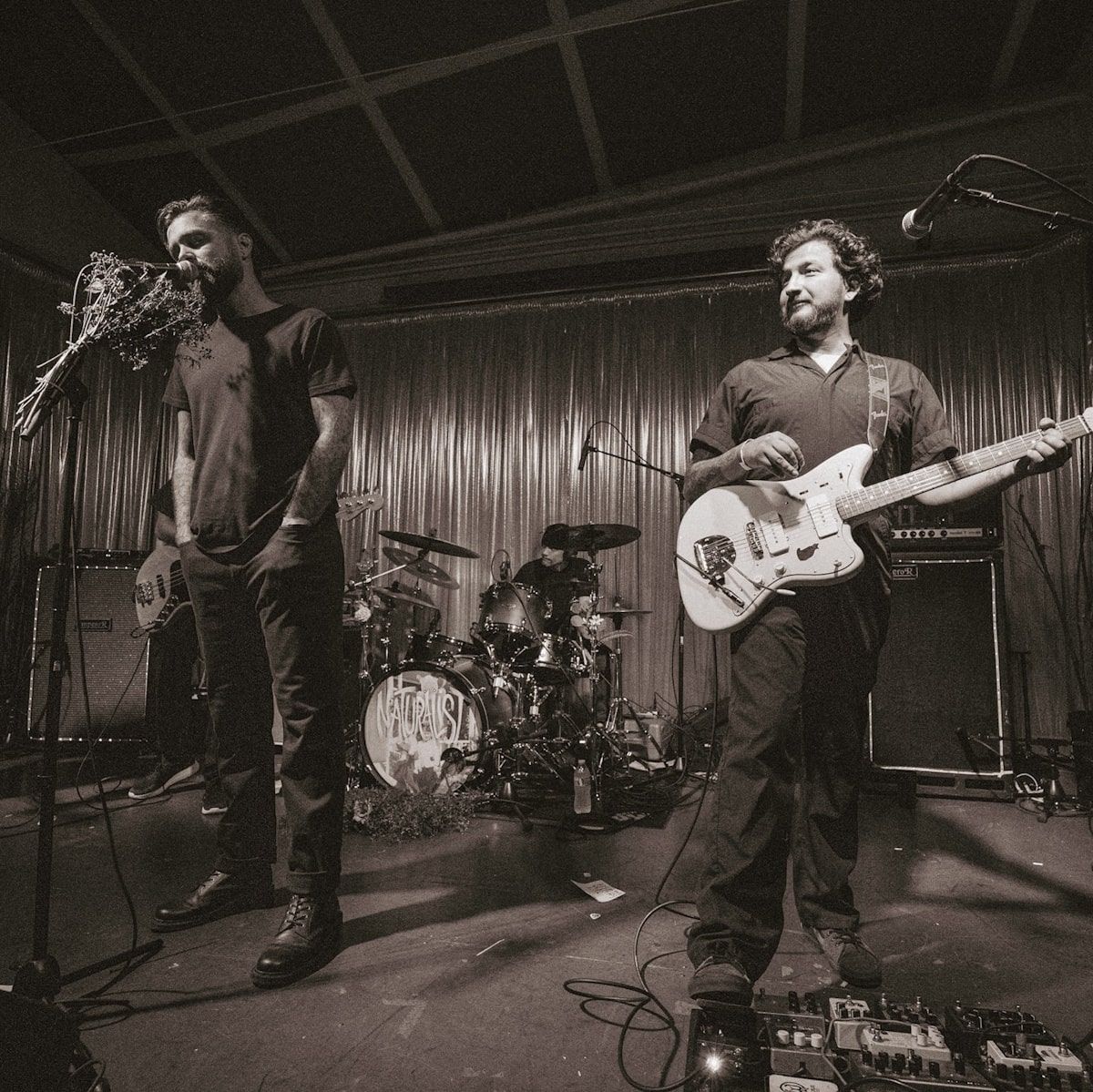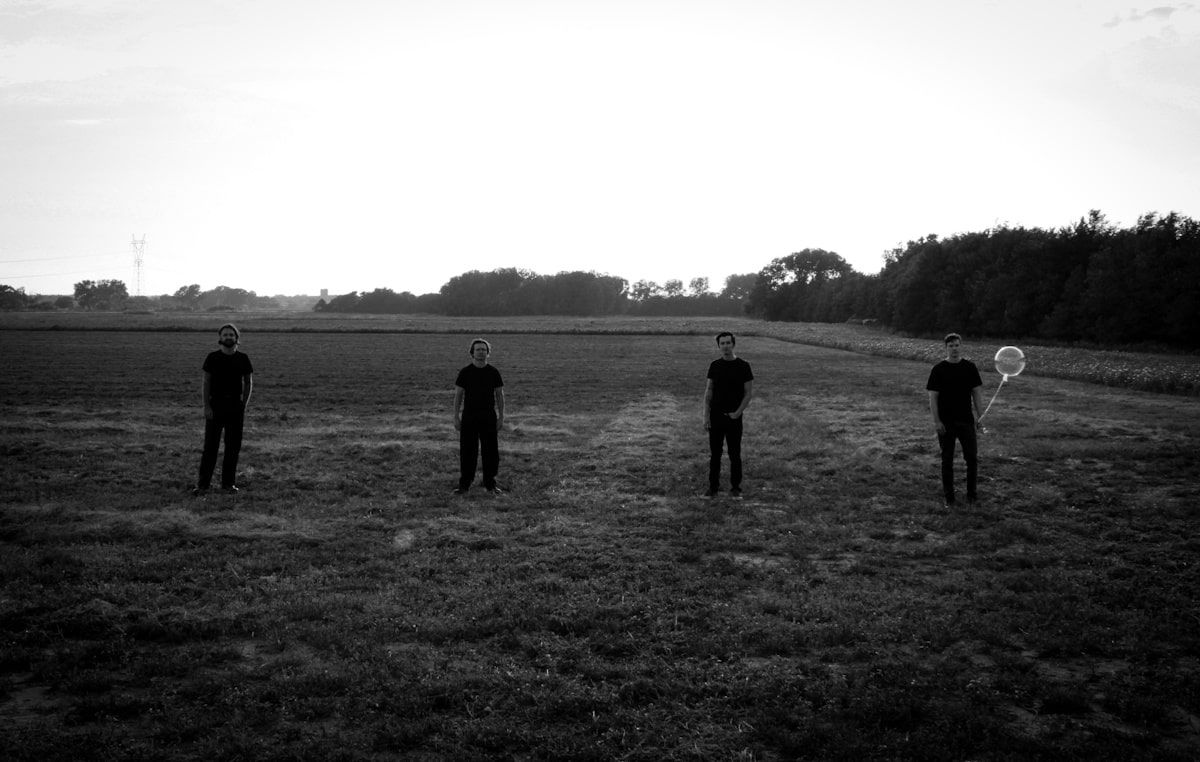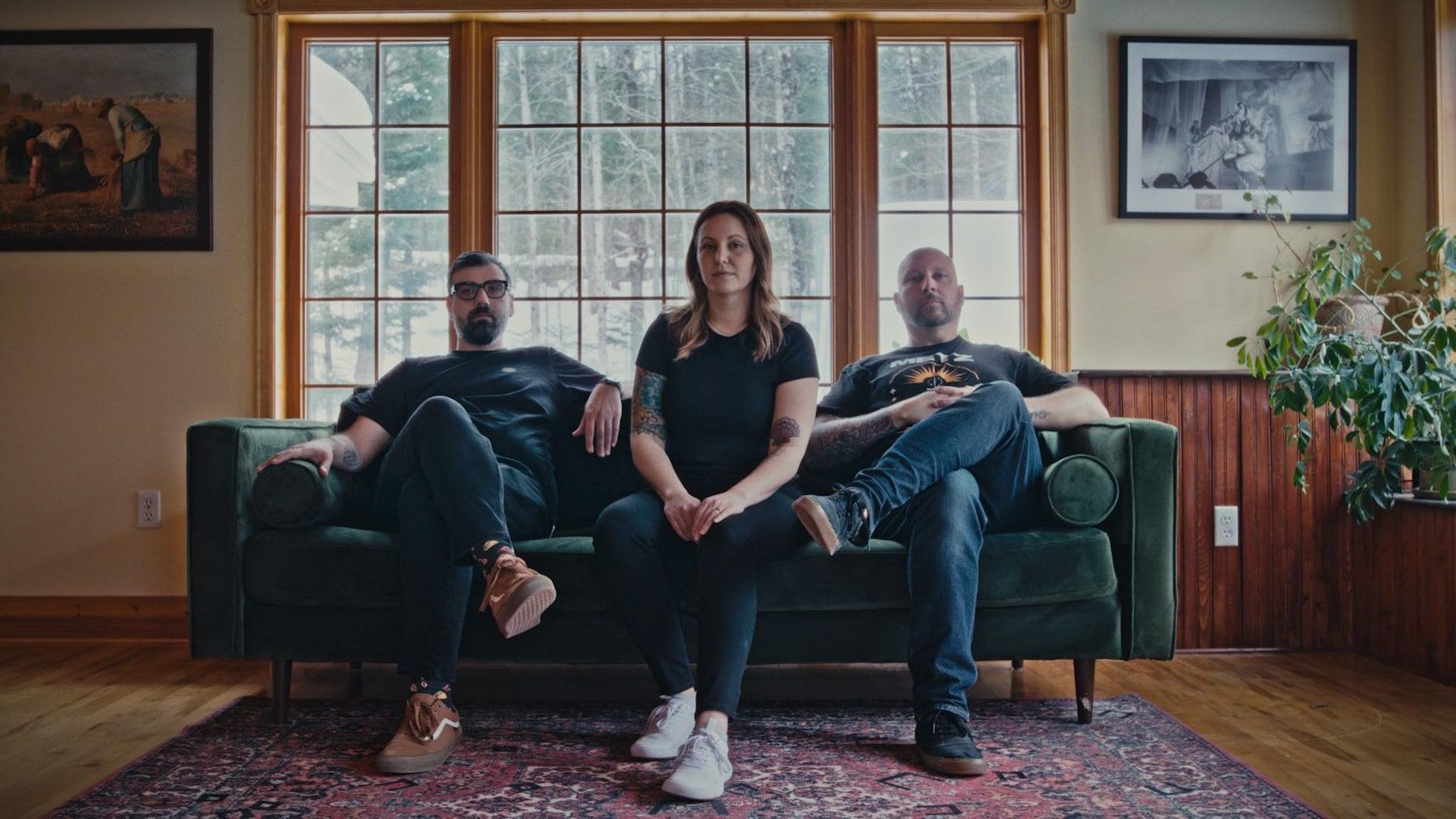It starts with a line that feels like a confession: “I want to be in a car crash.” It’s not for shock value. It’s not a metaphor stretched too thin. It’s just the raw truth of where the mind can go when it’s unraveling — and Naturalist let that unraveling happen out loud.
You Don’t Have to Worry, released April 11 via Friend Club Records, is the sound of a band that’s not trying to prove anything anymore. After more than a decade in the Oklahoma scene, they’ve stopped chasing an idea of what they’re supposed to be. This record is just them. “If this is the last thing we do, I want it to be the best thing we’ve ever done,” guitarist Hunter Amos said. “Something we can show our kids someday and be proud of.”
That line doesn’t come from a press release. It comes from a room where four friends — Ashton Prescott (vocals), Amos, Tyler Sanchez (bass, vocals), and Micah Patrick (drums) — pulled the curtains closed and wrote from the place they actually live in. The result is a 10-track full-length that leans into emotional friction, spiritual burnout, generational damage, and fragile reconciliation. At its core, this record is about inheritance — the kind that leaves no paper trail.
“This song is incredibly personal to me,” Prescott said about lead single Family Ties, “as it explores the concept of inheritance — not the kind we get to choose, but the kind that shapes us in the ways we don’t often realize.” He added, “It’s about finding peace in the idea that not everything has to have a deeper meaning.”
That duality runs through the whole record. On one side: a post-hardcore foundation — bands like mewithoutYou, Birds in Row, Modern Color, and ISIS in the bloodstream. On the other: a songwriter in his thirties, trying not to repeat himself while still writing the kind of songs that feel like a journal entry you accidentally left out in public. “Naturalist has always been my personal diary,” Prescott said. “It was important for me not to fall back into the same topics I’ve written about in the past.”
View this post on Instagram
Naturalist didn’t set out to make a grand statement when they formed. As guitarist Hunter Amos put it, “Our band’s origin story is quite uneventful and lighthearted.” He recalls being asked offhandedly if he wanted to start a band — despite being in a death metal phase at the time — by “two slightly older guys who looked like they led a youth group at church.” That unlikely mix became a defining trait. From mewithoutYou and Pianos Become the Teeth to ISIS and Modern Color, the band’s influences spread wide, but what ties it all together is what Amos calls “something beautifully punishing” about melancholy — “its duality that transcends so many things.”
Naturalist’s process has always stayed raw. “Usually, one of us brings a riff, and we just jam on it, completely improvising,” Amos said. That spontaneity fuels the emotional undercurrent of the album. You Don’t Have to Worry is full of callbacks to earlier work — “those unmistakable ‘that’s a Natty thing’ moments” — but it also reaches new ground. For Amos, it represents “almost like a complete realization.” For vocalist Ashton Prescott, the pressure hit differently this time. “Honestly, I felt a lot of anxiety about writing lyrics and arranging my vocals,” he admitted. “Writing lyrics in your thirties is a lot harder… I didn’t want to become a broken record.”
The local scene has been just as much a part of the band’s story as their internal chemistry. “We feel incredibly fortunate to have been part of our local music scene for the past 10 years,” they commented. Based in Oklahoma, Naturalist are part of what they describe as a tightly connected, non-competitive community. Prescott points to bands like Downward, Chat Pile, Ben Quad, Red Sun, CLIFFDIVER, Limp Wizurdz, and Sunfo as proof that something real is growing. “New bands are emerging all the time,” he said, “and as someone who has been around the scene for so long, I’m constantly inspired by their drive.”
You Don’t Have to Worry
At its core, You Don’t Have to Worry is about what we inherit and what we carry — emotionally, spiritually, generationally. Naturalist move through memories of natural disaster, emotional manipulation, family illness, and internal collapse, not to find resolution, but to speak plainly into the silence those events often leave behind. These songs document inherited trauma, the slow work of healing, and the struggle to distinguish what belongs to us from what was passed down without permission.
Ashton Prescott, writing from the perspective of a father, son, and grieving grandson, uses the album as a kind of reckoning. Some songs confront spiritual disillusionment (Savior), others circle the weight of familial ties (Family Ties, Empty Bodies), while some — like the closer You (pt.2) — attempt to measure up to the memory of someone now gone. The record is steeped in personal loss, but it resists self-pity. “It’s about finding peace in the idea that not everything has to have a deeper meaning,” Prescott explains.
The emotional through-line is one of internal conflict — a search for meaning that doesn’t always resolve, and a desire to protect others while being quietly wrecked. The album doesn’t offer answers, but it does offer honesty. You Don’t Have to Worry asks whether we can escape the patterns we come from, or if survival sometimes just means learning how to live with them.
Full track-by-track commentary from the band follows below.
Sonder – Before I started writing for this album, I bought the book “The Dictionary of Obscure Sorrows,” which is essentially a collection of new words for complex emotions. The word “Sonder” really stood out to me – it means “the realization that each random passerby is living a life as vivid and complex as your own.” This song is about exploring the selfish parts of myself. There’s a certain irony in lines like ‘I want to be in a car crash” and “I want to be in a coma.” These are incredibly selfish things to say, but it was important for me to fully embrace the message I was trying to convey.
Our friend Chizzy drove up from Texas to add guest vocals, and he did an incredible job. “Sonder” sets the tone musically for what we are trying to accomplish on this album.
Family Ties – This is the first single we released from ‘You Don’t Have to Worry.” We really wanted to return to our heavier roots, and I think this song does a great job of showcasing that. When I was working on the vocal arrangements for this album, I told the guys that I wanted the singing parts to sound huge, album choir-like. One thing about our band is that everyone is always willing to try out some of the ideas I come up with. In this case, I’m glad it worked out.
This song is incredibly personal to me as it explores the concept of inheritance – not the kind we get to choose, but the kind that shapes us in the ways we don’t often realize. “Family Ties” delves into the weight of generational patterns and questions whether we are truly unique individuals or if our flaws and struggles are passed down from our families. It’s a reflection on the influence of our lineage and the invisible threads that bind us to our past.
Personally, this song has been a way for me to explore my own tendencies to find meaning in everything. It’s about finding peace in the idea that not everything has to have a deeper meaning and accepting that while my family may have influenced who I am, my flaws are my own to navigate.
Good Man – We first released “Good Man” on the “Savior” EP back in 2022. This was the first song we wrote for that EP and the first song we created after deciding to return to our heavier roots. We all loved this song so much that we decided to re-record it, along with the other two songs from ‘Savior,” for “You Don’t Have to Worry.”
This song is about being in an emotionally abusive relationship and exploring the experience of being emotionally manipulated. It delves into the painful process of questioning your reality and the long-term effects this kind of manipulation can have on a person. “Good Man” is a raw and honest reflection on the struggles of dealing with emotional abuse and the journey to reclaiming your sense of self.
You Don’t Have to Worry – This is the first song I wrote lyrics and vocals for, and it’s the most personal song on the album for me as I wrote it for my daughter, Harper. While Naturalist has always had slower songs, I think we were able to finally encapsulate the emotion we were hoping for on this track. A lot of that is a testament to Tyler Garcia, who produced the album.
“You Don’t Have to Worry” is a reminder to my daughter that I am always here, that I know life is heavy at times, but I will always be here to help her carry that weight. As a father, having Harper sing the line “You don’t have to worry. I’m waiting right outside” at the end of the song is incredibly special to me. It’s my personally reminder that I don’t need to worry all the time; I have something so beautiful and wonderful waiting for me. I guess it’s also a bit ironic, because worrying is part of being a parent. Haha.
Liminal – The word “Liminal” means occupying a position at, or on both sides of, a boundary or threshold. I remember getting the first mix of this song and driving around in my car listening to it, thinking, “this is the most insane thing we’ve ever written.” We really wanted to have a track on the album that didn’t have any pre-defined rules, a song where we could really branch out and explore a different side of our band musically.
I am so proud of the way this song came out. I would be doing a great disservice if I didn’t mention our friend and musician Cale Horton, who wrote and performed the keyboard and programming work for this album. He absolutely crushed it on this song.
One Continuous Loop – In my opinion, this is the quintessential Naturalist song. I think we kind of knew that as we were writing it and leaned into it. Compared to some of the other songs on the album, this song is a bit more approachable to a broader audience and is for everyone who has been a fan of our band’s previous work.
One thing I will say is that I credit the guys in the band for pushing me on this album with my vocal delivery, to really emphasize what I am trying to say without screaming the entire time. This song is about feeling stuck in the same patterns, wanting things to change but always ending up right back where you started. It’s a reflection on the cyclical nature of life and the struggle to break free from repetitive cycles.
Savior – This track holds a special place in our hearts. Originally part of our “Savior” EP, we knew it had to be featured on “You Don’t Have to Worry.” Lyrically, this is one of the songs I’m most proud of. Written during the COVID-19 pandemic, it captures the emotions I was experiencing at the time.
“Savior” addresses the troubling shift of the religious right towards racism and conspiracy theories. I tried to paint a stark picture of Jesus, depicted with a white face, turning away from a church that misuses his teaching to justify police brutality, anti-mask and anti-vaccine sentiments, QAnon, and other harmful ideologies. The song also touches on the importance of autonomy, emphasizing how our actions and considerations for others can be a profound gift.
Our friend Matthew Ryan Smith from the band Hodera wrote and contributed vocals to the chorus and we couldn’t be happier with his performance.
Empty Bodies –We’ve been rehearsing the new songs quite a bit lately, and I have to say this is my favorite to play live. The lyrics were born out of a deeply personal experience – packing up my grandfather’s house as he moved into a memory care facility due to his battle with dementia. There’s a quote that really resonates with me: “You don’t have a soul. You are a soul. You have a body.” This song is loosely based around that idea, reflecting my journey of coping with my grandfather’s condition and the impact it has on me.
05202013 – This is absolutely my favorite song on the album. I feel like this is the most dynamic song we have written as a band, and it does an incredible job showcasing everyone’s talents. The song is about the horrific tornado that tore through my hometown of Moore, Oklahoma, on May 20th, 2013. The events of that day left a lasting impact on so many lives, including my own. This is my way of processing the destruction, the loss, and the way it has shaped me as an individual.
You (pt.2) – This track is the final one of the three originally from our “Savior” EP, but we completely reimagined it for “You Don’t Have to Worry.” Featuring our talented friend Ryan “Tuck” O’Leary from Fit for A King & Off Road Minivan, I am constantly blown away by his performance.
I wrote “You (pt.2)” as a way to cope with my grandmother’s passing. It reflects my journey of caring for my grandfather in her absence and striving to live up to the man she believed I could be. This song bookends the album, and I couldn’t be happier with how it turned out.












